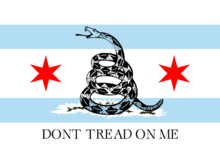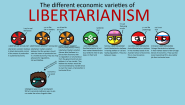Chicagoan Libertarianism is a kind of libertarian, economically center right to far-right, and culturally centrist but sometimes left-leaning political ideology.
It is used quite often to refer to ![]() Neoliberalism, although only a few economists of this school have referred to themselves as neoliberals.
Neoliberalism, although only a few economists of this school have referred to themselves as neoliberals.
It is quite a simple ideology, it's ![]() Libertarianism based on the thought of the Chicago School of Economics, which is a Neoclassical school of economics associated with the University of Chicago, mostly known for the Libertarian economist of second generation, and Nobel prize winner, Milton Friedman.
Libertarianism based on the thought of the Chicago School of Economics, which is a Neoclassical school of economics associated with the University of Chicago, mostly known for the Libertarian economist of second generation, and Nobel prize winner, Milton Friedman.
Within the precise ideas on economic believes, it is associated with the rejection of ![]() Keynesianism in favor of
Keynesianism in favor of ![]() Monetarism (Which states that it's desirable to have a Monetary policy controlled by the government as long as it expands money supply consistent with GDP growth) until the mid-1970s when it turned to new classical macroeconomics strongly based on the concept of rational expectations. Specifically,
Monetarism (Which states that it's desirable to have a Monetary policy controlled by the government as long as it expands money supply consistent with GDP growth) until the mid-1970s when it turned to new classical macroeconomics strongly based on the concept of rational expectations. Specifically, ![]() Neo-Keynesian economics was developed as a response to new classical economics and Friedman's critiques to Keynesianism, electing to incorporate the idea of rational expectations without giving up the traditional Keynesian focus on imperfect competition and sticky wages.
Neo-Keynesian economics was developed as a response to new classical economics and Friedman's critiques to Keynesianism, electing to incorporate the idea of rational expectations without giving up the traditional Keynesian focus on imperfect competition and sticky wages.
Chicago economists have also left intellectual influence in other fields, notably in pioneering public choice theory and law and economics, which have led to revolutionary changes in the study of political sciences. The school also has some research done that has left some impact in fields as diverse as social economics and economic history. Thus, there is not a clear delineation of the Chicago school of economics, a term that is more commonly used in the popular media to refer to Friedmanite economics rather than being used in actual academic circles.
History
Chicagoan Libertarianism derives from the ![]() Chicago School of Economics, mainly under the teachings of Milton Friedman, albeit there were several other acclaimed economists before Friedman, commonly known as the "First Generation," ofthe Chicago School of Economics. The most notable of these economists being, but not limited to, Frank Knight, Henry Simons, Jacob Viner, Aaron Director and Theodore Schultz, among others. These men laid the groundworks for what would soon become an Economic Revolution.
Chicago School of Economics, mainly under the teachings of Milton Friedman, albeit there were several other acclaimed economists before Friedman, commonly known as the "First Generation," ofthe Chicago School of Economics. The most notable of these economists being, but not limited to, Frank Knight, Henry Simons, Jacob Viner, Aaron Director and Theodore Schultz, among others. These men laid the groundworks for what would soon become an Economic Revolution.
Milton Friedman was a student of Frank Knight who would go on to write several influential pieces, of which he'd win a Nobel Peace Prize in 1976, and go on to change the framework of not only Western, but Global Economic Policy. Friedman supported Free Trade, Small Government, Limited Economic Regulation, Central Banking, Fiat Currency and Monetary Caution, among others. Friedman is often cited as one of the most famous economists in World History, influencing conservatives, liberals and libertarians alike across the world from America to China, from Chile to Sweden. His teaching are felt throughout the world to this day, and is considered as one of the greatest economists of all time.
Friedman's Legacy still carries on to this day, with many of his students still carrying the Torch of his success. Even more leftist groups and institutions praise Friedman for his policies of limited regulation and Free Markets. He would tragically end up passing away due to Heart Failure on November 16th of 2006
Personality and Behaviour
Chicago Libertarians behave as an average kind of moderate Libertarian economist.
How to Draw

ChicagoLib's design is a combination of the Chicagoan and Gadsden flags
- Draw a ball,
- Draw the flag of Chicago (2 horizontal light-blue lines, with 2 red stars between them',
- Draw a black Gadsden snake,
- (Optional) Below the snake draw some variation of the words "Don't tread on me",
- Draw the eyes, and you're done!
| Color Name | HEX | RGB | |
|---|---|---|---|
| Light Blue | #C9F1FF | 201, 241, 255 | |
| Red | #FF0000 | 255, 0, 0 | |
| Black | #141414 | 20, 20, 20 | |
Relationships
Friends
 Hayekism - My more radical nephew who wants to completely free the banking sector.
Hayekism - My more radical nephew who wants to completely free the banking sector. Paleolibertarianism - A bit more traditional sibling.
Paleolibertarianism - A bit more traditional sibling. Libertarianism - My father who's got almost the same beliefs as me.
Libertarianism - My father who's got almost the same beliefs as me. Neoliberalism - My best known son.
Neoliberalism - My best known son. Social Libertarianism - A bit too regulationist, but UBI is pretty cool.
Social Libertarianism - A bit too regulationist, but UBI is pretty cool. Classical Liberalism - My moderate Grandpa.
Classical Liberalism - My moderate Grandpa. Austrolibertarianism - Good guy! Wish he liked my monetary policies more though.
Austrolibertarianism - Good guy! Wish he liked my monetary policies more though. Monetarism - My forgotten son.
Monetarism - My forgotten son. Georgism - You're the least bad tax.
Georgism - You're the least bad tax. Reactionary Liberalism - My very old liberal pal, JAK, Seuk and Shaked are specially based.
Reactionary Liberalism - My very old liberal pal, JAK, Seuk and Shaked are specially based.
Frenemies
 Paleoconservatism - He used to be a cool guy back in the day, but now he's a protectionist that doesn't value free trade, also way too statist.
Paleoconservatism - He used to be a cool guy back in the day, but now he's a protectionist that doesn't value free trade, also way too statist. Anarcho-Capitalism - Government is very important in providing law and order, property rights, and even regulations, among others. Please open up a bit.
Anarcho-Capitalism - Government is very important in providing law and order, property rights, and even regulations, among others. Please open up a bit. Pinochetism - I've already said it but I'll say it again; I never advised Pinochet, I never endorsed Pinochet. (However, I'll admit that there was indeed quite a miracle in Chile's economy!)
Pinochetism - I've already said it but I'll say it again; I never advised Pinochet, I never endorsed Pinochet. (However, I'll admit that there was indeed quite a miracle in Chile's economy!) Third Way - Neolib, but too willing to compromise with Keynesians
Third Way - Neolib, but too willing to compromise with Keynesians
Enemies
 Social Democracy - They have corrupted the Western societies with their inefficient bureaucracy and their welfare states.
Social Democracy - They have corrupted the Western societies with their inefficient bureaucracy and their welfare states. Right-Wing Populism - you claim to oppose the upper guy,yet you still believe in the welfare state nonsense!(VOX is somehow based though)
Right-Wing Populism - you claim to oppose the upper guy,yet you still believe in the welfare state nonsense!(VOX is somehow based though) Keynesianism - Way too statist, and he doesn't even know the basics of economics. Your
Keynesianism - Way too statist, and he doesn't even know the basics of economics. Your  son is pretty cool though.
son is pretty cool though. Social Libertarianism - Don't tread on me,you filthy fake libertarian Keynesianism simp!
Social Libertarianism - Don't tread on me,you filthy fake libertarian Keynesianism simp! National Socialism - They want to treat people differently before law, and killed several millions of people.
National Socialism - They want to treat people differently before law, and killed several millions of people. Marxism–Leninism - Socialist and authoritarian. No. Just no.
Marxism–Leninism - Socialist and authoritarian. No. Just no. Market Socialism - Socialist cannot have a fair market,your worker's council bureaucracy makes me want to puke and too much worker power makes it uncompetitative.not to mention many of you simps for
Market Socialism - Socialist cannot have a fair market,your worker's council bureaucracy makes me want to puke and too much worker power makes it uncompetitative.not to mention many of you simps for  this c*mmunist.
this c*mmunist. Cybercommunism - AI commie that wants to get rid of me,we kicked out you from Chile for some reason.
Cybercommunism - AI commie that wants to get rid of me,we kicked out you from Chile for some reason.
Further Information
Wikipedia
- Chicago school of economics
- Milton Friedman
- Permanent income hypothesis
- Natural rate of unemployment
- Negative income tax
- Quantity theory of money
- Monetary disequilibrium theory
- School voucher
Literature
- A Program for Monetary Stability by
 Milton Friedman
Milton Friedman - Capitalism and Freedom by
 Milton Friedman
Milton Friedman - The Optimum Quantity of Money: And Other Essays by
 Milton Friedman
Milton Friedman  Basic Economics by
Basic Economics by  Thomas Sowell
Thomas Sowell
Gallery
| | |
- ↑ Some of the Chicago Boys, such as Álvaro Bardónand Sergio de Castro, even saw dictatorship as the ideal regime to ensure market neutrality. De Castro, who had a leadership role with the Chicago Boys, wrote that "a person's actual liberty can only be secured by an authoritarian regime that exercises violence by enforcing equal rules for all."


